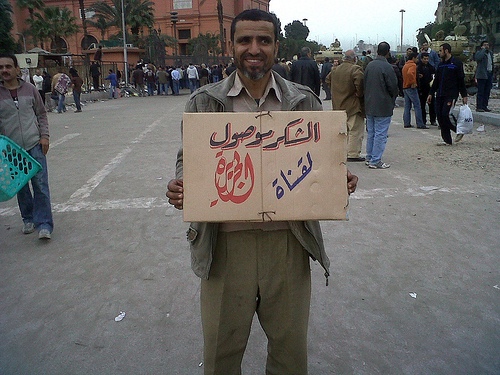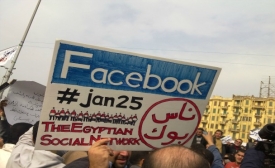Middle East

First, let’s be clear that this was the Egyptian Revolution, not the “Facebook Revolution” or the “Twitter Revolution.” Events of the past few weeks belong wholly to spirit of the Egyptian people, not technology. And although it was built on democratic aspirations, this was not a revolution that drew any inspiration from the United States.
WASHINGTON -- From events of the past three weeks a number of lessons can be drawn, some old and some new:
First, the phrase "the Arab street" has been redefined by Tahrir Square. We don’t need acute listening agents or polling to see what the Arab world wants.

The USC Center on Public Diplomacy and the USC Annenberg Center on Communication Leadership & Policy were pleased to co-host a round-table discussion about the media and Middle East Turmoil. News and social media played a crucial role as revolution sweeps through much of the Arab world.
Over the last century or so, Israelis have worked to make Israel a part of the Middle East. Israeli sabras (native born Israelis) with their argumentative attitudes; take no prisoners mentality; love for hummus, falafel and “Israeli” salad; tan skin; the yalla (let’s go) and no-translation needed ‘tseh (tongue hiss) live up to the Middle Eastern stereotypes and fit in with regional commonalities. If a tourist was dropped off in a nightclub or beach in Beirut or Tel Aviv, the only notable difference between the patrons would be the spoken language.

The age of the image is upon us and the clock cannot be turned back. And yet the Mubarak regime is in denial. It started with muffling the voice of al-Jazeera. I was fortunate to be in Cairo during the first two days of the current uprising. On January 25 and 26, when the roads around me were starting to be blocked, when sirens and loud speakers could be heard in the areas surrounding Tahrir Square, and when both the police and protesters were mobilizing in larger numbers than ever before, I was struck by the inattention that al-Jazeera was giving the protest.
With armies of reporters from Al Jazeera and Alhurra and slews of other news media organizations covering the Middle East, one wonders how the seeds of anti-government sentiment in Egypt were not detected before streets were filled with protesters and now police violence and death. Diplomats in Washington and other world capitals seem to have been similarly blindsided.
This is one of those rare, defining moments in world history. In Egypt - as well as Tunisia, Sudan, Yemen and elsewhere - change is unfolding at almost blinding speed. The reactions of the USA, EU, and UN so far have succeeded mainly in positioning the international community well behind the curve, scrambling to catch up. Developments on the ground continue to outpace responses by a wide margin.







